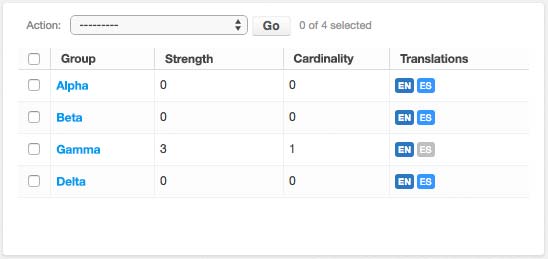Collection of helpers and mixins for translated projects.
Project description

Continuation of the deprecated project Divio Aldryn search.
Aldryn Translation Tools
A collection of shared helpers and mixins for translated django-CMS projects.
To use, install it into your project using pip:
pip install djangocms-aldryn-translation-tools
Contributing
We’re grateful to all contributors who have helped create and maintain this package.
Contributors are listed at contributions page.
admin.AllTranslationsMixin
Automatically adds a list of language “tags” in the changelist. Tag color indicates the state of translation for that object. Grey meaning untranslated, blue meaning translated. Darker versions of each are used to indicate the current language.
Each tag is linked to the specific language tag on the change form of the object.
A similar capability is in HVAD, and now there is this for Parler-based projects.
Preview:

To use this, merely import and add the mixin to your Model Admin class:
from parler.admin import TranslatableAdmin from aldryn_translation_tools.admin import AllTranslationsMixin class GroupAdmin(AllTranslationsMixin, TranslatableAdmin): # ....
If you wish to put the tags into a different column, you can add all_translations to the list_display list wherever you’d like, otherwise the “Languages” column will automatically be placed on the far right.
models.TranslatedAutoSlugMixin
This is a TranslatableModel mixin that automatically generates a suitable slug for the object on save().
If slug_globally_unique is True, then slugs will be required to be unique across all languages.
If slug_globally_unique is False (default), then the strategy used here is that it is OK for two objects to use the same slug if the slugs are for different languages. So if this were used on a translated Article model, these URLs would be valid:
/en/pain - An article in EN about physical discomfort
/fr/pain - An article in FR about bread
Of course, this means that when resolving an object from its URL, care must be taken to factor in the language segment of the URL too.
When using this mixin, it is important to also set the slug_source_field_name property on the implementing model to the name of the translated field which the slug is to be derived from. If you require more slugs to be derived from multiple fields (translated or otherwise), simply override the method get_slug_source to provide the source string for the slug.
Configuration properties
slug_default
Provide a lazy translated string to use for the default slug should an object not have a source string to derive a slug from.
slug_field_name
Provide the name of the translated field in which generated slug shall be stored.
slug_globally_unique
A boolean flag controlling whether slugs are globally unique, or only unique with each language. Default value is False.
slug_max_length
Declares the max_length of slugs. This defaults to the max_length of the slug_field and is determined via introspection.
slug_separator
This determines the separator used before any index added to the slug. It does not determine the separator used in the slug itself, which is always -. This is only provided for compatibility with the slugify()`` method in aldryn_common, but it is not recommended to be used. Defaults to -.
slug_source_field_name
Provide the name of the translated field to be used for deriving the slug. If more than one field, or other complex sources are required, override the method get_slug_source() instead. Note that if get_slug_source() is overriden, it is recommended to also override get_slug_default().
Public methods
get_slug_default
Naively constructs a translated default slug from the object. For better results, just set the slug_default property on the class to a lazy translated string. Alternatively, override this method if you need to more programmtically determine the default slug.
Example: If your model is “news article” and your source field is “title” this will return “news-article-without-title”.
get_slug_max_length
Accepts an optional parameter idx_len.
Introspects the slug field to determine the maximum length, taking into account a possible separator and up to a [idx_len]-digit number.
get_slug_source
Simply returns the value of the slug source field. Override for more complex situations such as using multiple fields (translated or not) as the source.
models.TranslationHelperMixin
Public Methods
known_translation_getter()
Signature:
(value, language) = obj.known_translation_getter(field, default=None, language_code=None, any_language=False)
Acts like Parler’s safe_translation_getter(), but respects the fallback preferences as defined in settings.CMS_LANGUAGES and provides both the translated value and the language it represents as a tuple.
This is especially helpful when resolving an object’s absolute url for a given language. If a fallback is used (respecting preference), then the returned language_code can then be used to set the correct context for a reverse() to get a URL consistent to the resulting language.
For example:
from django.utils.translation import override
from aldryn_translation_tools.models import TranslationHelperMixin
from cms.utils.i18n import get_current_language
from parler.models import TranslatableModel, TranslatedFields
class Fruit(TranslationHelperMixin, TranslatableModel):
translations = TranslatableFields(
name=models.CharField(...),
slug=models.CharField(...)
)
def get_absolute_url(self, language=None):
language = language or get_current_language()
(slug, language) = self.known_translation_getter('slug',
default=None, language_code=language, any_language=False)
with override(language):
return reverse('fruit-detail', kwargs={'slug': slug})
In contrast, if we had only done something like this:
...
def get_absolute_url(self, language=None)
language = language or get_current_language()
slug = self.safe_translation_getter('slug', default=None,
language_code=language, any_language=False)
with override(language):
return reverse('fruit-detail', kwargs={'slug': slug})
Then, if the fruit apple has not yet been translated to FR it is possible that you’ll end up with the slug in a fallback langauge, and the rest of the URL in the requested language, so instead of getting a language-consistent fallback url:
/en/apple/
You might get:
/fr/apple/
Which, at best, would be confusing for site visitors but more likely won’t exist resulting in a NoReverseFound exception or 404 and which clearly is not respecting the fallback preferences set by the developer.
Project details
Release history Release notifications | RSS feed
Download files
Download the file for your platform. If you're not sure which to choose, learn more about installing packages.
Source Distribution
Built Distribution
Hashes for djangocms-aldryn-translation-tools-1.0.0.tar.gz
| Algorithm | Hash digest | |
|---|---|---|
| SHA256 | 489b689fa77766602f835deade709d657ad99c59b0ba60ed3bcf72e413e07572 |
|
| MD5 | a0ba59e7d5903644d128983d1e45ccdd |
|
| BLAKE2b-256 | b83fd3e8cc676a41c95cae463026519f5c9d318f07d98f59433fb9e049bcc768 |
Hashes for djangocms_aldryn_translation_tools-1.0.0-py3-none-any.whl
| Algorithm | Hash digest | |
|---|---|---|
| SHA256 | c223be7ff0caafed8dd590b07ec808739a5e80545848f7513145fc4db6e6c9f8 |
|
| MD5 | 06530dd679ae12fd291ffaf73d7ab5ee |
|
| BLAKE2b-256 | a09b8de48ce3c001809ca0a01e7b71fde83303ecdcf0eda5a839eb9cc5b02ead |
















